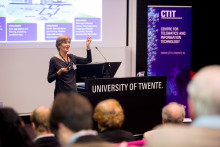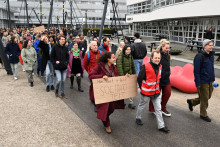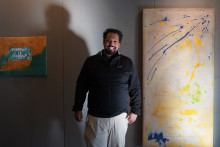Siobhán Clarke was one of the keynote speakers at the symposium titled Citizenship in a Digital Society, which has taken place today in the Waaier. Clarke, who is a specialist in the field of Computer Science, presented her lecture on ‘The role of technology in enabling behavioral change for cities of the future’.
‘Some of the best changes happened through regulation’
‘We can use technology to change our behavior,’ began Siobhán Clarke. ‘Asking citizens isn’t enough and full automation also isn’t the way to go, and so we have to find something in between. Some of the best changes have happened through regulation. I can think of several very positive examples, one of them being the smoking ban, which has been very successful. Another example is the charge on plastic bags, which forces every citizen to pay for every plastic bag individually.’

Communicating vehicles
Besides regulations, Clarke thinks that technology can be used to improve the quality of life, especially in cities. Technology could, for instance, support urban mobility, which currently has many flaws including pollution, traffic accidents or congestion. ‘There is a big ecological and economic cost to this. In cities like Chicago, people waste 70 hours a year due to congestion. Not to mention that humans are horrible drivers, which leads to many injuries and deaths,’ continued Clarke.
According to Clarke, smart vehicles could be an answer to these problems: ‘Car is basically a big fat computer. Cars provide a lot of information, including information about themselves. The solution might lie in cooperating vehicles that communicate with each other. Benefits would include less congestion, less crashes and reduced pollution.’ Based on tests conducted by Prof. Clarke and her team, it would not even be necessary for all vehicles on the road to cooperate with each other. ‘If we have 20% of cooperative vehicles driving on the road, it already leads to a smoother flow. In fact, there was no difference between using 20% or 40% of autonomous cars that cooperate.’
Cooperative use of energy
Modern urban areas also struggle with the usage of energy. This might be improved by sharing. ‘Sharing is the only solution for sustainable lifestyle in cities,’ said Clarke. ‘This is true for energy use as well. Energy usage is not equally distributed during the day and supply of energy from sustainable sources isn’t always stable. Technology could help us with more efficient use of energy. Electrical devices could communicate with each other and use energy based on the overall usage in the community. This, of course, wouldn’t work for all devices. You can’t limit when people use their kettle to make tea or tell them when to cook dinner, but there are devices that could be controllable this way.’







